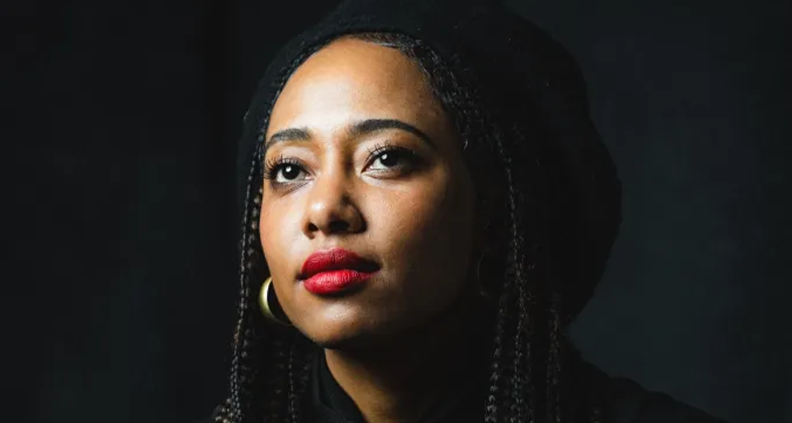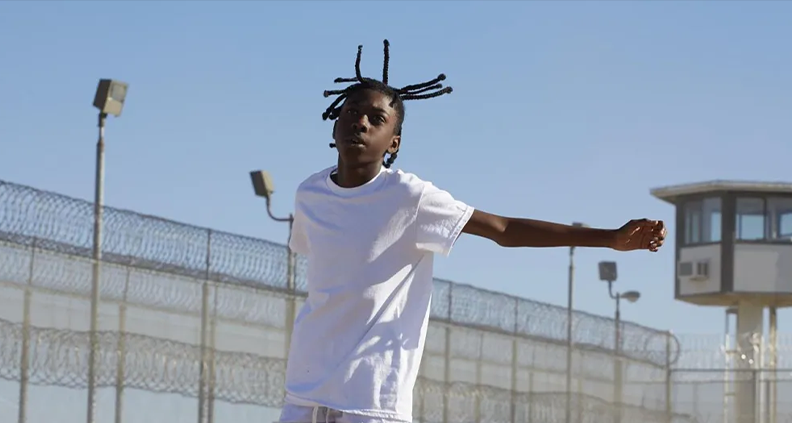WATCH: Amplifier Fellow Contessa Gayles’s Powerful Music Doc ‘Songs From the Hole’ on Netflix
Songs From the Hole, which premieres today on Netflix, is rooted in music. It’s the story of James ‘JJ’88’ Jacobs, a Long Beach musician who, at age 15, took the life of a young man. Three days later, Jacobs and his family experienced their own tragedy when James’s brother Victor was murdered.
For his crime, Jacobs was sentenced to 40 years to life plus life. In the California prison system, he came to face what he did, and what happened to him. While in solitary confinement, he turned to music and wrote about his journey as a way to heal, share his story, and learn to live with the worst thing he’s ever done.
The film Songs From the Hole follows Jacobs, now in his 30s, as he and his family attempt to navigate the system to reduce his sentence. The film, directed by Film Independent Amplifier Fellow Contessa Gayles, tells the story through his music as JJ’88, with compelling and aethereal visuals. Each song shows a different side of Jacobs, like his despair and anger, his regret or his faith, and unveils a new part of the story.
“I hope that folks see in 88’s story and in his family’s story another offering for what we can do and how we can respond when violent harm happens, that the answer to violence doesn’t have to be more violence.” Gayles said. “Also on the systemic level, the answer to people causing harm does not have to be introducing more harm of incarceration.”

Photo by: Michael Ori
She came across Jacobs and his story while shooting her first feature film, the CNN produced The Feminist on Cellblock Y. Jacobs was a group member of the feminist self-help group led by another incarcerated man, richie reseda, who is now a producer on Songs From the Hole. “88 shared just a little bit of his story of meeting Jamaal [the man who killed his brother] and forgiving Jamaal and how transformative that was,” she said. “I saw how powerfully it resonated with those guys in that context.”
When the three decided to make a film together, Jacobs already had written treatments for music videos to go along with each song he wrote. He and Gayles went back and forth over the phone and in handwritten letters developing them and incorporating parts of Jacob’s life.
“During production, richie was taking screenshots of some of the dailies and sending them as printed out photos in the mail so 88 could see some of what was like physically manifesting on set from some of the things that he had wrote, which was powerful. Sometimes we could time it right where 88 could call while we were on set and he could just say ‘hi’ to the crew and the actors and interact for a little bit.”
Gayles, whose background is in documentary, saw shooting those music videos as an opportunity to grow creatively. “That’s his art, and he was putting it into my hands to interpret and bring to life in a lot of ways. And that really pushed me creatively to know that I didn’t want to let him down, knowing what a testimony it is,” she said.
“It was an opportunity to do something that felt culturally impactful because the art is so strong. I just didn’t want to disappoint.
“So I made the decision then, ‘let me bring my A game’.

Gayles took Songs From the Hole through our inaugural Amplifier Fellowship which was sponsored by Netflix, so the film having its worldwide release on the streaming platform felt like a full-circle moment for her. She said how working with fellows who were working on narrative projects also sharpened the music video work. She also credited the mentorship for helping her career long-term. “Brenda Robinson came in as my mentor, and that was amazing. She’s been such a supporter of us in this film and me and my career.”Once the film was completed and making the rounds on the festival circuit, the team also started screening the film for prisons, jails, and child prisons. “Just to make our impact dollars really work for us, anywhere that we were already going for a film festival screening, we decided to plug in with a community partner and bring the film to directly impacted communities,” Gayles said. “So we did that basically in every city that we had a festival screening, and we did nearly 40 impact screenings outside of festival locations, as well.”
Beyond screening the film, there were live performances of the music, and guided discussion circles that covered healing and accountability.
“richie and 88 developed a more extended version of a curriculum that is more specific to using art as a tool for healing and artistic practice as a tool for healing, and that is available in California state prisons, along with the film and folks can watch the film, go through the curriculum and earn some time off their sentence for that,” she said.
In terms of what she hopes people take away, Gayles said “I made this film because I want to help people heal, and I believe this film and the way that we made it, and this story and the way we’ve told it, has the power to do that.”
Film Independent promotes unique independent voices by helping filmmakers create and advance new work. To become a Member of Film Independent, just click here. To support us with a donation, click here.
More Film Independent…